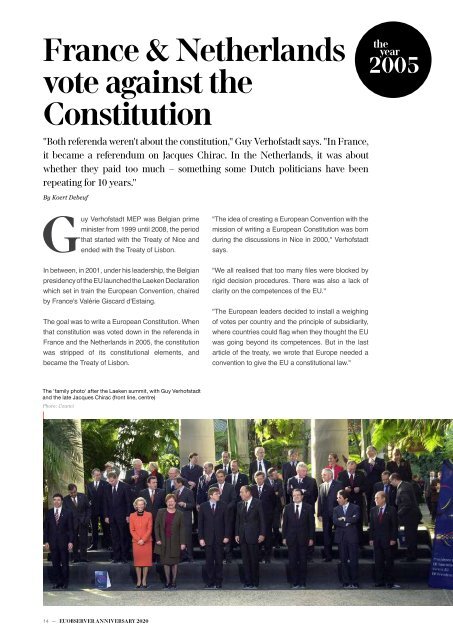20 years of European journalism & history
Twenty years doesn't seem a lot. Certainly not in the light of European history. But while we were writing this magazine for the 20th anniversary of EUobserver, we were surprised just how much happened in the European Union in those two decades.
Twenty years doesn't seem a lot. Certainly not in the light of European history.
But while we were writing this magazine for the 20th anniversary of EUobserver, we were surprised just how much happened in the European Union in those two decades.
You also want an ePaper? Increase the reach of your titles
YUMPU automatically turns print PDFs into web optimized ePapers that Google loves.
France & Netherlands<br />
vote against the<br />
Constitution<br />
the year<br />
<strong>20</strong>05<br />
"Both referenda weren't about the constitution," Guy Verh<strong>of</strong>stadt says. "In France,<br />
it became a referendum on Jacques Chirac. In the Netherlands, it was about<br />
whether they paid too much – something some Dutch politicians have been<br />
repeating for 10 <strong>years</strong>."<br />
By Koert Debeuf<br />
Guy Verh<strong>of</strong>stadt MEP was Belgian prime<br />
minister from 1999 until <strong>20</strong>08, the period<br />
that started with the Treaty <strong>of</strong> Nice and<br />
ended with the Treaty <strong>of</strong> Lisbon.<br />
"The idea <strong>of</strong> creating a <strong>European</strong> Convention with the<br />
mission <strong>of</strong> writing a <strong>European</strong> Constitution was born<br />
during the discussions in Nice in <strong>20</strong>00," Verh<strong>of</strong>stadt<br />
says.<br />
In between, in <strong>20</strong>01, under his leadership, the Belgian<br />
presidency <strong>of</strong> the EU launched the Laeken Declaration<br />
which set in train the <strong>European</strong> Convention, chaired<br />
by France's Valérie Giscard d'Estaing.<br />
The goal was to write a <strong>European</strong> Constitution. When<br />
that constitution was voted down in the referenda in<br />
France and the Netherlands in <strong>20</strong>05, the constitution<br />
was stripped <strong>of</strong> its constitutional elements, and<br />
became the Treaty <strong>of</strong> Lisbon.<br />
"We all realised that too many files were blocked by<br />
rigid decision procedures. There was also a lack <strong>of</strong><br />
clarity on the competences <strong>of</strong> the EU."<br />
"The <strong>European</strong> leaders decided to install a weighing<br />
<strong>of</strong> votes per country and the principle <strong>of</strong> subsidiarity,<br />
where countries could flag when they thought the EU<br />
was going beyond its competences. But in the last<br />
article <strong>of</strong> the treaty, we wrote that Europe needed a<br />
convention to give the EU a constitutional law."<br />
The 'family photo' after the Laeken summit, with Guy Verh<strong>of</strong>stadt<br />
and the late Jacques Chirac (front line, centre)<br />
Photo: Counci<br />
14 — EUOBSERVER ANNIVERSARY <strong>20</strong><strong>20</strong>

















